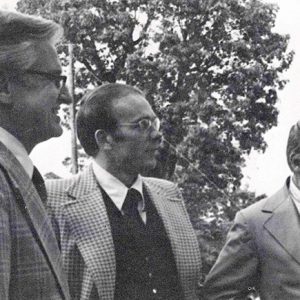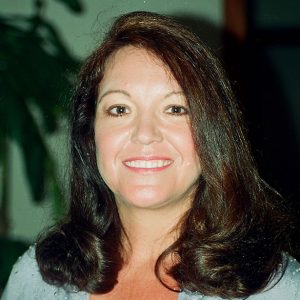calsfoundation@cals.org
Jim McDougal (1940–1998)
aka: James Bert McDougal
James Bert (Jim) McDougal was at various times a political aide, politician, instructor of political science, real estate developer, and banker who attained national attention due to his involvement in what came to be called the Whitewater scandal. His second wife, Susan Henley McDougal, was also implicated in the investigation.
Jim McDougal was born on August 25, 1940, in Bradford (White County), the only child of Leo and Lorene McDougal. He attended public schools. In 1960, he helped with the presidential campaign of John F. Kennedy in Arkansas and was later offered a position as an aide in the office of Senator John McClellan. McDougal left the University of Arkansas (UA) in Fayetteville (Washington County) after his freshman year to go to Washington DC, where he later became an aide to Senator J. William Fulbright. In Washington, McDougal met and married his first wife, Delores Lieberman. They had no children and were divorced in a few years.
While working for Fulbright in 1968, McDougal met Bill Clinton, then a summer intern in Fulbright’s office. Fulbright lost his reelection campaign in 1974, and McDougal was recommended on the basis of his political experience for the job of instructor of political science at Ouachita Baptist University (OBU) in Arkadelphia (Clark County) by former lieutenant governor Bob Riley, who was then head of the department. Around this time, McDougal began speculating in small real estate deals and invited various friends to invest, earning them a profit. He met OBU student Susan Henley, and on May 23, 1976, just after her graduation, they were married. The ceremony was officiated by Bob Riley and attended by friends Bill and Hillary Clinton, Jim Guy Tucker, and Tucker’s wife, Betty.
McDougal left his job at OBU after their marriage, and they began to work together in the real estate business. In 1978, when Bill Clinton was elected governor, McDougal became an economic development liaison in the governor’s office. He left in 1980 when Clinton lost his bid for reelection and moved to Kingston (Madison County), where he bought the small Bank of Kingston and renamed it Madison Bank & Trust.
In 1982, McDougal failed in his campaign to become the Third District’s U.S. congressman against Republican incumbent John Paul Hammerschmidt. That same year, a bad loan wiped out the bank in Kingston. McDougal bought Woodruff Savings & Loan in Augusta (Woodruff County), renamed it Madison Guaranty Savings & Loan, and moved it to Little Rock (Pulaski County). A subsidiary, Madison Financial Corporation (MFC), became a real estate development company.
In the spring of 1978, MFC made a deal for approximately 230 undeveloped acres on the south bank of the White River outside the town of Flippin (Marion County). It was incorporated on June 18, 1979, as the Whitewater Development Corporation, and the McDougals invited the Clintons to invest. They sold all the lots at the Arkansas interest cap of ten percent and paid off the note. However, national interest rates rose to twenty-three percent, forcing them to invest their own money. When the Whitewater development ultimately failed, McDougal was accused of attempting to cover its losses with commingled funds.
Other real estate deals financed by MFC, and financed and developed through the savings and loan, included Maple Creek Farms in 1983, a successful residential development of 1,000 acres twelve miles south of Little Rock. Others were less successful, and for Castle Grande, commingled funds from Madison Guaranty in amounts that exceeded the legal limit moved through various intermediaries. Federal regulators cited Castle Grande and McDougal after determining that its funding came from Madison.
Madison Guaranty failed in 1989 during the national savings and loan crisis, costing American taxpayers between $60 to $70 million in bailout funding, and McDougal was tried for bank fraud. (His divorce from Susan was finalized around this time, in 1990.) He grew bitter that his former friends, the Clintons, now in a presidential race, did not come to his aid and cooperated with a New York Times article published on March 8, 1992, just before the Super Tuesday primaries, alleging improprieties about the Whitewater land deal. In 1996, McDougal was investigated by the Office of Independent Counsel (OIC) under Kenneth Starr and, in 1997, due to his cooperation with the investigation, was sentenced to a reduced sentence of three years in prison on eighteen counts of felony bank fraud.
McDougal reportedly made a deal with the OIC because he said he did not want to die in prison. Though he received an abbreviated sentence, he died of a heart attack at age fifty-seven on March 8, 1998, while being held in solitary confinement in federal prison at Fort Worth. He is buried at Rest Haven Memorial Gardens in Arkadelphia.
For additional information:
Conason, Joe, and Gene Lyons. The Hunting of the President: The Ten-Year Campaign to Destroy Bill and Hillary Clinton. New York: St. Martin’s Books, 2000.
McDougal, Jim, and Curtis Wilkie. Arkansas Mischief: The Birth of a National Scandal. New York: Henry Holt & Co., 1998.
McDougal, Susan, with Pat Harris. The Woman Who Wouldn’t Talk: Why I Refused to Testify against the Clintons & What I Learned in Jail. New York: Carroll & Graf Publishers, 2003.
Nancy Hendricks
Arkansas State University








A fascinating bit of history about Jim McDougal and Sheffield Nelson. It all started on a Saturday morning, May 8, 1964, in the ballroom of the Marion Hotel. The Young Democrats (YD) of Arkansas were electing a new president to succeed Faubus’s executive secretary, John Browning. The chosen candidate was Sheffield Nelson, a handsome UCA grad and student-body president, who had gone to work as Witt Stephens’s assistant at Arkla Gas. The reformers on the other side (who would now be called the radical left) were led by Sam Boyce, the prosecutor at Newport. (Both Boyce and Nelson would run later for governor and lose—Nelson twice, in 1990 and 1994.)
Sheffield had YD presidency wrapped up, but it was sort of stolen from him because of Jim McDougal and a wizened old man. I was at the Marion ballroom that morning when the delegates were to assemble there to elect the new president. I was sitting with McDougal in the ballroom while everyone mingled around waiting for the outgoing president and the new one were to arrive for the election and speechmaking. I did not know what was up and what I was seeing happen until much later, so I didn’t report all the details in the next day’s Gazette.
Boyce had contrived to set up new YD clubs in towns where his old law school classmates were and send delegates to Little Rock for the election. But they were not going to be recognized by the Credentials Committee of Faubus men like Claude Carpenter and Kay (Kennesaw Landis) Matthews and the Hale brothers. They did not have enough delegates to win anyway. Unbeknownst to most of us, McDougal and Uncle Max Allison had schemed to trap Sheffield, Browning, and others in the Marion elevator when they came down from their hospitality room on about the fourth floor to open the convention. Uncle Max had acquired a walkie-talkie. He was sitting near the elevator on the fourth floor when the group came out and got on. With his walkie-talkie he got a hotel worker to shut off the electricity to the elevator, trapping Sheffield, Browning, and a couple others between floors. While they were banging on the doors, at the stroke of 10:00 McDougal leaped to the podium and called the delegates to order (most were still mingling around the ballroom waiting for Browning and Sheffield and the others). In about two minutes, McDougal had dispensed with the report of the Credentials Committee, seated all delegates, accepted a motion to nominate Sam Boyce, and accepted another motion to close the nominations and elect Boyce by acclamation. It was done and Boyce was making his acceptance speech when they turned the power back on and Sheffield and Browning stumbled into the convention hall. They gathered the other delegates and went to another room and elected Sheffield as president, but the national YD headquarters recognized Boyce as the president.
Boyce ran for governor in 1966, two years later, and along with Frank Holt and others lost to Justice Jim Johnson, who then lost to Rockefeller. The Boyce people, like McDougal, became big Bill Clinton men or else Jim Guy Tucker men. Sheffield Nelson, Jim Guy Tucker, and Clinton were alternately allies and then enemies for the next thirty years.